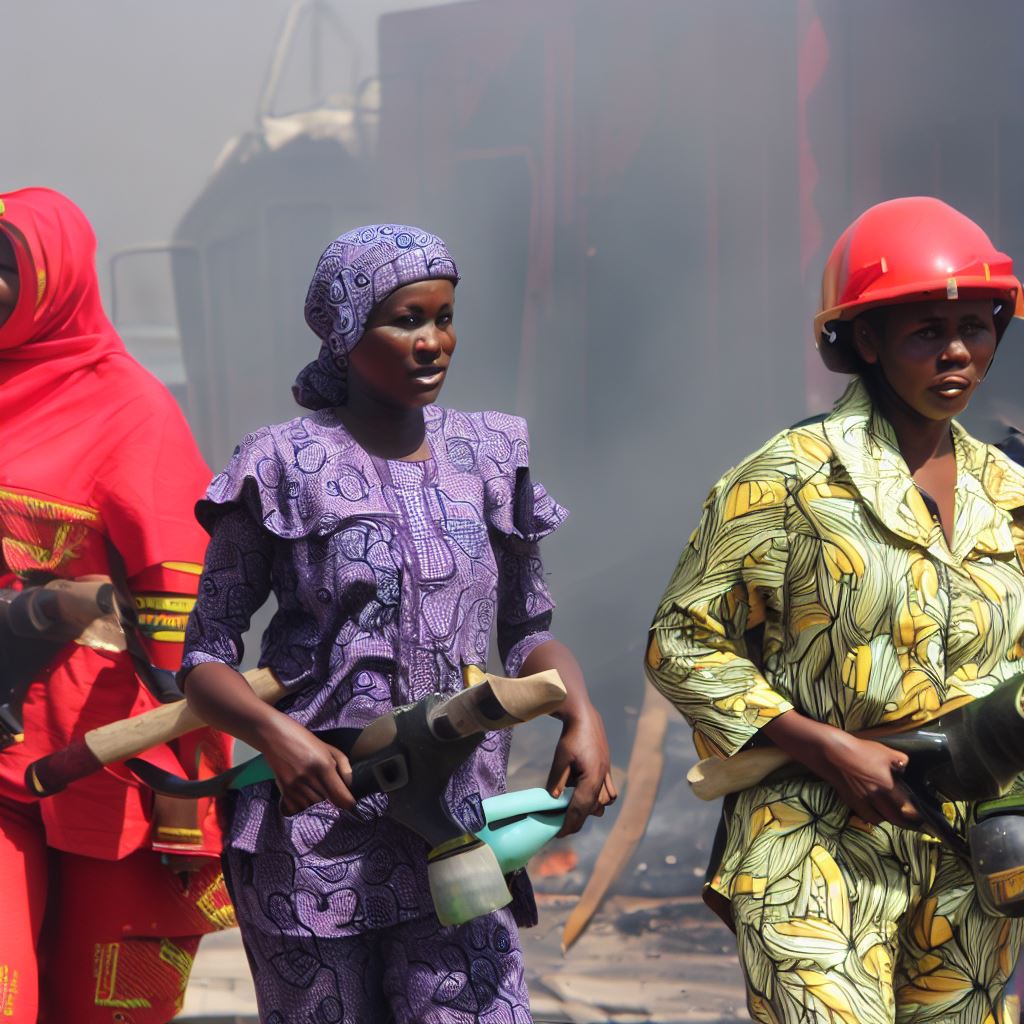Introduction
The spotlight is shining brighter than ever on the remarkable women in the field of fire fighting in Nigeria.
In a country where gender disparities persist in various industries, these fearless women are breaking down barriers with their dedication and resilience.
In recent years, there has been a growing recognition of the invaluable contributions made by women in fire fighting.
Their presence not only challenges outdated stereotypes but also demonstrates that bravery knows no gender.
These women serve as beacons of inspiration for the younger generation, encouraging them to pursue their dreams regardless of societal expectations.
Join us on a captivating journey through the lives and experiences of these trailblazing women in fire fighting.
Discover their stories of determination, courage, and the pursuit of a more equal and inclusive society.
Women in fire fighting are proving that when passion and purpose ignite, they can overcome any obstacle, no matter how daunting it may seem.
Historical context of women in firefighting
Traditional roles assigned to women in Nigeria in the past
Women in Nigeria were primarily expected to fulfill domestic responsibilities and take care of the household.
Their roles were often limited to being wives, mothers, or caregivers within their communities.
Opportunities for women in firefighting were highly restricted due to gender-based societal norms and cultural beliefs.
Women were considered physically weaker and less capable of handling the demands of firefighting.
Female empowerment and gender equality were not prioritized, hindering their progress in traditionally male-dominated fields.
Limited opportunities for women in firefighting
In the past, firefighting was predominantly seen as a profession for men in Nigeria.
Women faced discrimination, stereotypes, and biases, which limited their chances of entering this field.
Physical strength, endurance, and agility were wrongly perceived as prerequisites for firefighting.
Many Nigerians believed that women lacked the physical capabilities to handle the demanding nature of firefighting.
As a result, women were discouraged from pursuing careers in this male-dominated profession.
Historical events that helped pave the way for women in firefighting
The feminist movement in Nigeria challenged traditional norms and advocated for gender equality.
Increased education and awareness highlighted the capabilities and potential of women in all professions.
The Nigerian government recognized the need for diversity in firefighting and introduced policies to promote gender inclusivity.
Training programs and initiatives were implemented to equip women with the necessary skills for firefighting.
Female pioneers who defied social expectations and joined the firefighting profession paved the way for others.
These trailblazers shattered stereotypes and proved that women could excel in firefighting.
Despite the historical barriers and limited opportunities, Nigerian women have gradually broken through in firefighting.
With each passing year, more women are challenging the status quo and pursuing careers in this traditionally male-dominated field.
Through their determination, resilience, and competence, they are proving that gender should not be a hindrance to professional aspirations.
Efforts to provide equal opportunities and empower women in firefighting are gaining momentum.
By breaking down these barriers, Nigeria is acknowledging the value and potential that women bring to the firefighting profession.
Women in firefighting are now playing crucial roles in emergency response, fire prevention, and community safety.
They are not only breaking barriers but also inspiring future generations of women to follow their dreams.
As Nigeria continues to progress, gender equality in firefighting should be a priority.
Eliminating biases and promoting inclusivity will result in a more diverse and effective firefighting force.
When women are given equal opportunities, society as a whole benefits from their unique perspectives and contributions.
Together, men and women can work hand in hand to create safer communities and protect lives and properties.
It is time to embrace the potential of women in firefighting and appreciate the significant difference they make in Nigeria and beyond.
Read: Volunteer Fire Fighting: How to Get Involved in Nigeria
Current landscape of women in firefighting
According to recent statistics, the number of women currently working in the Nigerian fire service is significantly low.
These statistics show that women make up only a small percentage of the firefighting workforce in Nigeria.
This underrepresentation can be attributed to various factors that pose challenges for women in entering and excelling in firefighting.
Challenges faced by women in entering and excelling in firefighting
One major challenge faced by women is the physical demands of the job.
Firefighting requires strength, endurance, and agility, which are areas where women may face disadvantages.
Stereotypes and gender biases also contribute to the challenges faced by women in firefighting.
Often, women are perceived as less capable or suited for the physically demanding and dangerous nature of the job.
Additionally, the lack of female representation and role models in firefighting discourages aspiring women from pursuing this career path.
Discrimination and harassment in the male-dominated firefighting culture further hinder women’s progress.
Initiatives implemented to promote gender equality in the fire service
Recognizing the importance of gender equality, the Nigerian fire service has implemented several policies and initiatives:
- Active Recruitment Efforts: The service has made deliberate efforts to actively recruit more women into firefighting through targeted outreach and awareness campaigns.
- Specialized Training Programs: Tailored training programs have been developed to address the physical challenges that women may face in the profession, ensuring they have the support needed to excel.
- Mentorship and Support Networks: Mentorship programs and support networks have been established to provide guidance and assistance to women in firefighting, fostering a more inclusive and supportive environment.
These initiatives collectively aim to create an environment in which women can thrive in their firefighting careers.
Furthermore, the service has implemented awareness training on gender issues and sensitivity for all personnel, promoting a culture of respect and equality.
In fact, while the current landscape for women in firefighting in Nigeria may present challenges, proactive steps are being taken to break down barriers.
Read: Nigeria’s Fire Fighting: A Day in the Life of a Hero

See Related Content: Gender Equality in the Medical Secretary Field in Nigeria
Success Stories of Women in Firefighting
Firefighting has traditionally been perceived as a male-dominated field, but in Nigeria, there are numerous inspiring stories of women shattering barriers and excelling in this demanding profession.
These women have not only achieved great success but have also made significant contributions to their communities.
Their stories serve as a powerful motivation for other women interested in pursuing firefighting careers.
Chief Officer Adaobi Ogbonna: A Trailblazer in the Force
Chief Officer Adaobi Ogbonna is a true trailblazer, making history as the first female firefighter in Nigeria.
Despite facing skepticism and doubters, she displayed unwavering determination and overcame all obstacles.
Her courage and skill earned her respect within the firefighting community.
She has also saved countless lives through her bravery and quick thinking during critical situations.
She embodies the spirit of service, always putting the safety of others before her own.
Station Officer Fatima Mohammed: Leading by Example
Station Officer Fatima Mohammed is a remarkable example of leadership in firefighting.
Throughout her career, she has shown exceptional dedication to her community and has been instrumental in implementing innovative training programs for aspiring female firefighters.
Mohammed’s contributions extend beyond the fire station.
She actively participates in community outreach programs, educating the public about fire safety and prevention.
Her efforts have resulted in a significant decrease in fire-related incidents in her district.
Firefighter Blessing Eze: A Resilient Role Model
Firefighter Blessing Eze is an epitome of resilience and determination.
Despite facing numerous personal and societal challenges, she pursued her dream of becoming a firefighter.
Through sheer hard work and perseverance, Eze successfully graduated from the firefighting academy.
Eze’s success story has served as an inspiration to numerous young women who were initially disheartened by societal stereotypes.
Senior Fire Marshal Ngozi Okonjo: Shattering Glass Ceilings
Senior Fire Marshal Ngozi Okonjo has shattered glass ceilings in the firefighting profession.
Her exceptional leadership skills and in-depth knowledge have earned her the respect and admiration of her peers.
Okonjo has proven that women can excel in any field, given the opportunity.
Okonjo’s contributions to her community are immeasurable.
She has implemented various safety awareness campaigns and spearheaded initiatives to equip firefighters with the latest equipment and technology.
Her determination and commitment have significantly improved the efficiency and effectiveness of firefighting operations.
Inspiration for Future Female Firefighters
The success stories of these remarkable women in firefighting serve as powerful motivation for other women interested in pursuing this career path.
Their achievements prove that gender should never be a hindrance to success.
Here are some ways these success stories can inspire and motivate aspiring female firefighters:
Breaking Stereotypes
These women have shattered stereotypes and proved that firefighting is not limited to men.
Their success challenges societal norms and encourages other women to break barriers in any field they choose.
Encouraging Persistence
Despite facing obstacles and naysayers, these women remained persistent in their pursuit of their firefighting careers.
Their stories teach us the importance of resilience and the ability to overcome challenges.
Promoting Inclusivity
By excelling in firefighting and making significant contributions to their communities, these women have shown that a diverse workforce brings unique strengths and perspectives that benefit everyone.
They encourage inclusivity in traditionally male-dominated professions.
Inspiring Community Service
These women’s dedication to their communities beyond their firefighting duties is truly inspiring.
They illustrate the important role firefighters can play in community outreach, education, and prevention programs.
In general, the success stories of women in firefighting in Nigeria are a testament to their resilience, skill, and dedication.
Their achievements not only inspire and motivate aspiring female firefighters but also challenge societal norms and promote inclusivity in traditionally male-dominated fields.
Read: Fire Fighter Training: A Guide to Courses in Nigeria
Steps towards gender equality in fire services
- Challenge traditional gender norms: Encourage society to view firefighting as a viable career option for women.
- Increase recruitment efforts: Actively seek out women candidates and promote the opportunities available in the fire service.
- Provide mentorship programs: Pair female firefighters with experienced mentors to guide and support them in their career.
- Implement gender-sensitive training: Develop training programs that address the specific needs and challenges faced by women in firefighting.
- Ensure equal access to resources: Provide women with the same equipment, facilities, and resources as their male counterparts.
- Create inclusive policies: Establish policies that promote a supportive and inclusive working environment for all firefighters.
- Build community partnerships: Collaborate with organizations and community leaders to raise awareness about gender equality in firefighting.
- Recognize and celebrate female firefighters: Highlight the achievements and contributions of women in the fire service to inspire others.
- Encourage networking opportunities: Organize events and conferences that bring together women firefighters to share experiences and insights.
The importance of providing equal opportunities for both genders
Gender equality in the fire service is crucial for several reasons.
- Fairness and justice: Every individual, regardless of gender, deserves an equal opportunity to pursue their chosen career.
- Talent and diversity: By providing equal opportunities, we can tap into a broader talent pool, bringing diverse skills and perspectives to firefighting.
- Role models for future generations: When women succeed in firefighting, it paves the way for younger generations to pursue their dreams without limitations.
- Improved community relations: Gender equality in fire services fosters trust and strengthens relationships with the communities they serve.
Possible training and support systems to encourage women in firefighting
- Pre-recruitment preparation: Provide training programs to prepare women physically and mentally for the demands of firefighting.
- Ongoing mentoring and support: Establish mentorship programs to guide women throughout their firefighting careers.
- Flexible work arrangements: Allow for flexible schedules and accommodations to support women’s work-life balance.
- Safe and inclusive workplace culture: Foster a respectful environment that values diversity and ensures zero tolerance for harassment or discrimination.
- Family-friendly policies: Offer maternity leave, childcare support, and breastfeeding facilities to support female firefighters who are also mothers.
- Continuous professional development: Provide opportunities for advanced training and career advancement to encourage retention of female firefighters.
- Addressing stereotypes and biases: Educate all members of the fire service about unconscious biases and promote inclusivity.
By implementing these steps and creating a supportive and inclusive environment, Nigeria can break barriers and promote gender equality in its fire services.
Gender should never be a barrier to one’s passion and ability to serve and protect their community.
Let us work together to create a future where every individual has an equal opportunity to pursue a career in firefighting.
Read: Challenges and Triumphs: Fire Fighting in Nigeria
Explore Further: Intercity Transit in Nigeria: A Bus Driver’s Perspective
Conclusion
Women breaking barriers and pursuing careers in firefighting is of immense importance. It signifies the power of gender equality and the dismantling of traditional stereotypes.
When women enter the fire service, they bring diverse perspectives and valuable skills that contribute to a more effective and inclusive firefighting force.
The progress made in promoting gender diversity in firefighting is encouraging.
More women are now joining the profession, challenging the notion that firefighting is exclusively a male domain.
This increased representation of women in firefighting can have a profound impact on the profession.
Gender diversity in the fire service leads to improved problem-solving and decision-making processes.
Women bring different strengths and approaches, enriching the overall capabilities of firefighting teams.
Studies have shown that diverse teams are more innovative and successful in achieving their goals.
Efforts to promote inclusivity and gender equality in male-dominated professions like firefighting must continue.
It is essential to create an environment that supports women’s career advancement, provides equal opportunities for training and development, and ensures fair and equitable treatment.
Nigeria, like many other countries, needs to foster a cultural shift that recognizes and celebrates women’s contributions in traditionally male roles.
Women breaking barriers and pursuing careers in firefighting is crucial for society’s advancement. It is a testament to the strength and potential of women in male-dominated professions.
As we strive for a more inclusive world, let us continue to champion and support the journey of women in firefighting and other similar fields.




